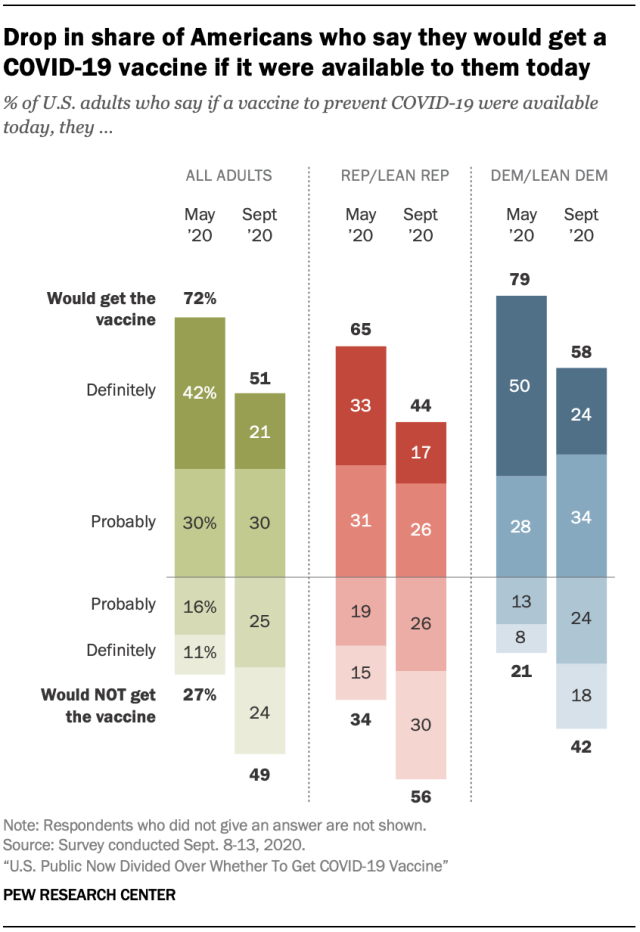
“But if Donald Trump tells us that we should take it, I’m not taking it.” These words were defiantly stated by Senator Kamala Harris at the 2020 vice presidential debate when she discussed the forthcoming coronavirus vaccine. As a healthcare provider, her words resonated with me, but at the same time, went against everything I’ve come to know.
The politicization of the vaccine development process has seeded doubt in many Americans, including myself. I am a nurse practitioner, and being hesitant about a vaccine is a paradox for me. I have been a fierce proponent of vaccines for all of my professional life. I have relied heavily on recommendations from the Centers for Disease Control and Prevention (CDC) as the foundation for my practice. I believe in the science behind vaccines, and go out of my way to deny anti-vax conspiracy theories and hearsay.
In March of 2020, as COVID-19 was beginning to take hold throughout the United States, I obsessively referred to the CDC for guidance on how to respond both professionally and personally. But as the months have gone by, my once staunch belief in the CDC’s authority has eroded. I’ve watched on as Congress and the White House undermined the word of Dr. Anthony Fauci. I’ve also seen Robert Redfield, the CDC director, buckle under the pressure coming from the Oval Office – revising general guidelines to fit political narratives.
Other agencies have been pressured to deny the inconvenient truths of the SARS-CoV-2 virus. The most disturbing one is the very agency that will approve a coronavirus vaccine: the Food and Drug Administration. The FDA even publicized its guidelines for emergency use authorization for vaccines in an effort to assuage skeptics. This move from the FDA supports its mission of safety over efficacy, reinforced by the pharmaceutical companies’ pledge to stand with science. The fact that a pledge was even necessary speaks volumes about the level of consumer vaccine hesitancy. The politicization of medicine has sewn doubt to such a degree that it is causing some reluctance among healthcare professionals. Now I am struggling to reconcile my belief in vaccine science with the fear that the process prioritizes a Trump’s end-of-year deadline.
While it seems very unlikely that a vaccine will be available before election day – and likely not until 2021 – President Trump yearns for a political win. A COVID vaccine has become the pillar of the administration’s pandemic response. This end-of-year deadline in itself was surprising since it came from a man who is vaccine-hesitant by all accounts. In the past, President Trump has eluded to a connection between vaccines and autism. He also alarmed healthcare professionals when he declared he would lead a “vaccine safety commission” to explore U.S. vaccine policy concerns.
I was frustrated when President Trump announced the vaccine safety commission in 2017. I continue to struggle with understanding how an issue that arose from lousy science – the link between autism and vaccines – could be dictating vaccine policy nearly twenty years later. The Wakefield study suggesting the connection between autism and vaccines was not retracted from medical journals until 2010. It was ample time for the anti-vax movement to take hold in the United States – and sway our President.
Vaccine resistance throughout the nation is not just a contemporary issue. In 1905, precedent for government-mandated vaccines was set when the Supreme Court ruled on the landmark Jacobson v. Massachusetts court case. Henning Jacobson invoked his individual liberty when refusing the smallpox vaccination during the epidemic of 1902. Jacobson refused the vaccine citing adverse effects from previous vaccinations. The issue escalated when he refused the vaccine and didn’t pay the five-dollar fine levied against him by the city of Cambridge. The United States Supreme Court supported the government’s right to restrict individual liberty when justified. In that case, the state was deemed justified because it was “under the pressure of great dangers” caused by an epidemic.
Today, COVID-19 is a worldwide pandemic. The entire country is under immense pressure, and the general public’s safety should be the priority of all healthcare professionals and politicians. In the United States, this priority has diverged as some politicians have twisted the narrative of COVID-19. Science is an inconvenient truth for many politicians running for re-election in 2020. Our libertarian roots are causing confusion and conflict. Instead of a united response, we have witnessed state and local municipalities responding to the coronavirus in a fragmented fashion. A standard theme underpinning policy is individual freedom, and public health has taken a back seat.
I am trying to suppress my inner libertarian, telling me that I have a right to refuse a vaccine if I do not believe in its safety. This is the United States; we all have this right – to varying degrees. I especially don’t like the nagging voice in my head questioning the science of a vaccine being rushed to market. Before coronavirus, I had a hard time understanding seemingly rational people’s fear of vaccines. Now I can empathize with their anxiety.
Nevertheless, I will suppress this fear by relying on science. I will continue to remind myself that the FDA has set forth guidelines prioritizing safety. I will depend on the pharmaceutical industry’s word that they will not submit for approval without data supporting safety. This process is unprecedented in many ways –including the level of cooperation between competing stakeholders – and I believe corners will not be cut. As a healthcare provider, I will follow the science, and echoing the words of Senator Kamala Harris:
“If public health professionals, if Dr. Fauci, if the doctors tell us that we should take it, I’ll be the first in line to take it, absolutely.”
______________________________________________________________________________________________________________________







